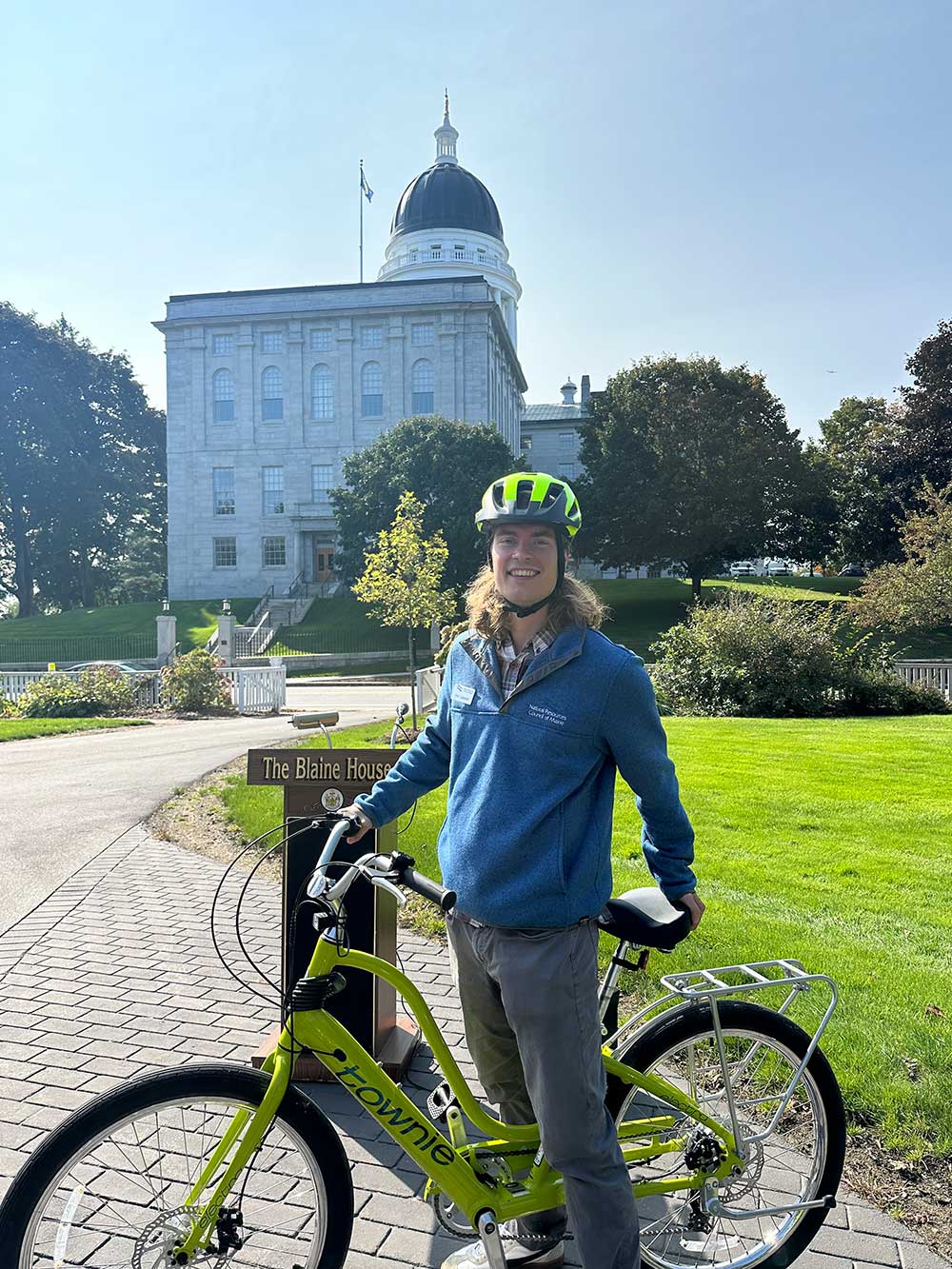 Our vision for Maine’s transportation future is one in which Mainers can get where they need to go with a variety of clean, affordable, and safe options.
Our vision for Maine’s transportation future is one in which Mainers can get where they need to go with a variety of clean, affordable, and safe options.
In this future, cars and trucks no longer run on fossil fuels, saving drivers money and giving us cleaner, healthier air.
Electric vehicle (EV) charging stations are everywhere — at workplaces, near residential areas, along major corridors, and at local businesses so EV drivers can charge wherever they work, shop, and play.
Zero-emission vehicles complement a robust public transit system that provides access to village and town centers in rural and urban areas.
New housing and business centers are located near transit stops so people can take most trips even if they don’t have a car.
Connected networks of walking and biking paths connect with transit hubs and provide walkers, bicyclists, rollers, e-bikers, and runners with access to nearby businesses, services, and homes.
The Natural Resources Council of Maine is committed to building toward that future, but the effects of climate change are already here. The signs and impacts are all around us as we respond to more severe storms, adjust our expectations for seasonal weather patterns, and combat new health and safety risks. Transportation pollution is the biggest contributor to climate change nationally and here in Maine. We must take action to address tailpipe pollution if we want to reduce emissions in line with what scientists say is necessary.
An Opportunity to Build the Transportation System for the Future
While climate change is disruptive and dangerous, it also provides an opportunity to make needed reform to improve outdated systems here in Maine that aren’t serving everyone fairly or equitably.
Transportation is a great example of how acting on climate builds a better future for us all. Maine’s current transportation system is dangerous, polluting, expensive, and inefficient. As the Natural Resources Council of Maine (NRCM) works with public health and clean energy partners across the state to reduce climate impact from cars and trucks, we have an opportunity to make the system better for all users.

Expanding Access to Zero-Emission Cars and Trucks
Zero-emission vehicles are a proven technology that must be a central part of our strategy. They are far more efficient than combustion engine vehicles; they cost less to maintain and operate; and they offer a better driving experience. They save Mainers money, reduce health impacts associated with air pollution, and contribute to the flexible, clean electric grid of the future.
When the Board of Environmental Protection voted not to adopt stronger standards for clean cars in 2024, they left billions in health and consumer savings on the table and put Maine in serious jeopardy of missing our established climate goals.
However, the global transition to zero-emission vehicles continues, as do our efforts to ensure that this transition brings the most possible benefit to Maine. The zero-emission vehicle market is breaking records each year, backed by billions of dollars of investment as major manufacturers shift their focus to the future of cars and trucks. NRCM will continue to make zero-emission cars and trucks more accessible to Maine drivers by advocating for stronger standards, better charging infrastructure, and expanded incentives.
Safer, Affordable Opportunities to Drive Less
We must also reduce harmful pollution from transportation by reducing our dependence on personal vehicles and increasing access to more affordable alternatives such as more frequent public transit, biking, walking, and rolling.
About three quarters of all car trips taken in Maine are less than 10 miles, and more than half are under 5 miles. This is true even in the most rural counties including Washington and Aroostook where public transit access is routinely identified as a priority. With safe walking and biking paths and dependable public transit options, many of those car trips can be replaced by safer, less polluting alternatives. On top of that, more than 50,000 Mainers across the state live in households without a car, and they need to be able to get to school, work, or a doctor’s appointment, too.
Here are some steps we can take right now to move forward:
- Create a strong Climate Action Plan update
Every four years, the Maine Climate Council updates Maine’s Climate Action Plan to improve our state’s climate goals and refresh our strategies. NRCM is helping to craft the new plan coming out this year, with a major focus on transportation. You can provide your input to the plan to the Maine Climate Council at this link. - Increase zero-emission vehicle education, awareness, and access
More Mainers than ever are driving zero-emission vehicles. NRCM’s survey of EV owners, Efficiency Maine’s rebates and educational materials, and more than $40 million of investment in our statewide charging infrastructure over the past three years are all helping drivers to make the switch. The most compelling sell? Having a friend or family member get one, or getting behind the wheel yourself. Seek out a car dealer near you to give one a go. - Develop next steps for truck electrification through Maine’s Clean Transportation Roadmap for Medium- and Heavy-duty Vehicles
NRCM is participating in a process to develop a roadmap for the electrification of trucks in Maine. That roadmap will be published in December of this year and will serve as a pathway to reduce air pollution from one of our dirtiest sectors. - Assess Maine’s transit needs and plan for a better transit future through the Public Transit Advisory Council (PTAC)
NRCM staff provide our expertise including by serving as the Vice Chair of the PTAC following legislation we helped to pass last year that strengthened the Council and doubled down on Maine’s commitment to transit. The next report of the PTAC will come out early next year and will identify priorities for Maine’s transit future. - Build upon Maine’s e-bike rebate program to get more Mainers on e-bikes
Last year, NRCM successfully advocated for the creation of a statewide e-bike rebate program to replace car trips around the state. The program is now up and running, and while not as ambitious as it could be, it serves as a foundation for continued incentives for a technology that is proven to reduce emissions. - Pass a Trails Bond for Maine to offer more non-road alternatives.
If passed by the Legislature, the Maine Trails Bond (LD 1156) would put a $30 million bond on the November ballot for the creation and maintenance of trails across Maine. Learn more and take action on the Trails Bond today!
We Can Do This! Healthier Transportation Options are Achievable
There’s plenty of disinformation and negativity being deliberately spread about electric vehicles and other climate solutions. That is because oil and gas companies and their allies don’t want a future where everyone doesn’t have to pay them to drive, heat their home, or turn on the lights.
We encourage Mainers to treat these naysayers with a healthy dose of skepticism and to seek out trusted sources. Not only do the opponents of a clean energy future seek to stall progress with no real alternative that makes people’s lives better, they make claims that are not backed by facts or evidence.
We know from experience here in Maine that we can do this. The vision of a healthier, more affordable and connected transportation network is achievable with concerted planning and investment. The clean car standards setback will not prevent us from achieving a clean transportation future for Maine, but it does add to the urgency with which we must act to get there. We’re ready to work together with Mainers from across the state for clean air solutions that work for everyone. We hope you’ll join us!
—Josh Caldwell, NRCM Climate & Clean Energy Outreach Coordinator










Leave a Reply